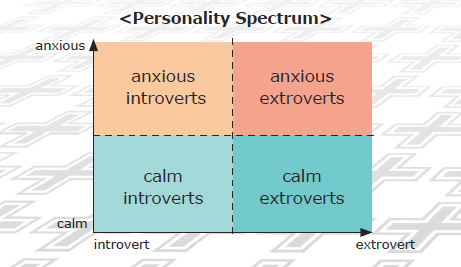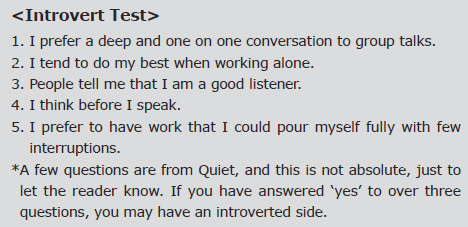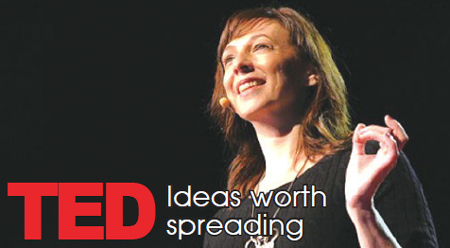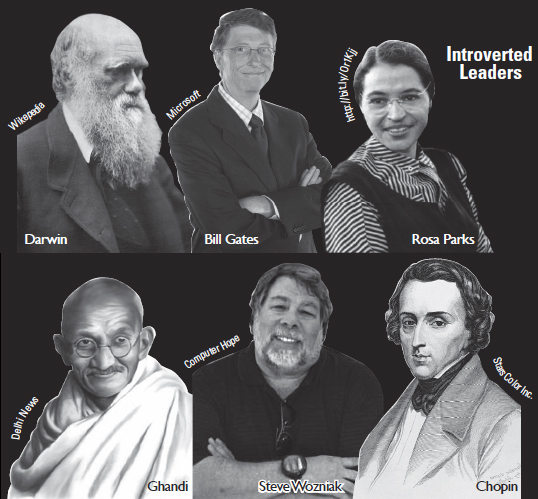From time to time, I wondered whether I am an introvert or extrovert. It always puzzled me because I was neither extremely introverted nor vice versa. Now I know I am an introverted person. Susan Cain (the author of the book) insists that a third to a half of our population is introverts; it means a person sitting next to you could be an introvert. Then, you might as well ask yourself, is my personal definition of an introvert correct? What truly defines an introvert? Why should we respect introverts and how do they change the world? As one of the introverts near you, I will lead you to the book on the power of introverts. <Quiet> will guide you to those answers.
What is an Introvert?
People sometimes mistaken introversion for shyness. Introversion is different from ‘shyness.’ Shyness means that people are having problems making social relations. Shyness may be painful because shy people are usually afraid of disapproval or humiliation. Introversion is not. Irrelevant to shyness, introversion depends mostly on how you respond to stimulation, especially, social stimulation. Introverts can maximize their performances and focus on their works in low-key environments. They concentrate on close relationships. They listen more, and tend to express themselves better in writing.

However, to remind you one more time, nobody is either an extrovert or an introvert. The spectrum between introvert and extrovert is vast. Even extroverts can be shy and introverts might be brave enough to bear public speaking. Susan Cain explained that the Personality Spectrum has the introvert-extrovert spectrum on horizontal axes and calm-anxious (how a person react to social stimulus) axes on vertical. Therefore, no one is extremely extroverted or introverted.
Before we head further into details on how society favors outgoing people, here are some questions to help you realize whether you are an introvert or not.

Contemporary Society Crazes over Extroverts
In her Technology Entertainment and Design (TED) lecture, Susan Cain said, “There is no correlation between being the best talker and having the best idea.” Then, despite of this fact, why do people or society favor the ‘outgoing’ personality? Why do we tend to follow more charismatic figures without even realizing it?
This strange tendency is rooted deeply in the Industrial Revolution. Before the revolution, people led their lives in rather quiet and intimate towns where everyone worked with people they knew. Character (or manhood) was the important virtue of their time.
Times have changed, and contrast to the past, ‘Culture of Personality (culture where expressing yourself is more important than what you have inside youself)’ began. Western society, especially American society rose as an industrial force. Business became a powerhouse of the 20th century. Big businesses, mass media and urban cities all contributed to changing people into employees. Sales became a crucial element for industries. This is when salesmen and charismatic leaders began to attract the public. Our most important institutions? schools and universities? as well as workplaces turned into atmosphere better suited for extroverts. Group work increased and all sorts of meetings and social talks became a necessary part of our daily lives. Susan Cain utterly asserted that this phenomenon is ‘Groupthink (A word created by I. Janis, Yale University.).’ Just like we see today, society is turning more towards favoring extroverts. Introverts unnecessarily have to feel guilty about not being ‘outgoing’ and are deemed as ‘outliers.’
The Power of the ‘Introverts’
There has been quite a lot of introverted leaders and figureheads throughout history; Rosa Parks, Ghandi, Steve Wozniak, Chopin, Einstein, Newton, Darwin, Marcel Proust (author of ‘In Search of Lost Time’), Bill Gates and so on. Introverts are powerful creators. Their creativity is hard to ignore.
If you think carefully about the aforementioned introverts, all of their creativity resulted from ‘solitude.’ Solitude is a very essential part of their brilliant works. Here are some examples. Steve Wozniak spent most of his nights working alone in his garage after work, making up what was going to be a model for MacBook computer. Darwin: he withdrew every dinner invitation and let himself take a walk in a forest and probably, his famous theory of evolution popped out when he was alone. Chopin, who wrote the most exquisite and elaborate piano tunes ever in music history, had to take his time for flow of inspiration. We have time to look deep into ourselves and pull out what is inside. Then, we can easily see how we can draw up more of our hidden introverts to bravely share what they have.

Making Introverts Bubble up to the Surface
When Susan Cain made her speech at TED 2012, she said she wanted three actions to cope with introverts to come out to the noisy world and show their strength. I would like to share them with you; partly because as an introvert myself, I was encouraged and did not feel shameful at all for being an introverted person and I want every reader, especially introverts, to love themselves and speak up, softly.
To start off, let us clear away unnecessary group works. We need to work on our own. Introverts and extroverts, both. Cain suggested that students need their autonomous time to wonder around with their ideas and then get to group works to share their best ideas. Second, we should try to get inside of our head a little more often. She described this as ‘going out to wildernesses’ like religious leaders. Find a silent place and practice thinking deeply. Third, for introverts, please, the world needs you. Bring out what is inside you. We need introverts to share their internal creativity, brilliant ideas and sometimes brave actions that might change the world.
There are many introverts you did not realize around you; your friends, co-workers, spouses or even close, your family members. In a world favoring extroverts who cannot stop talking, we need to realize that introverts do have their power of solitude and creativity. Let us respect and listen to them more.

Kim Hye-ryung Junior Reporter
parisienne314@uos.ac.kr

